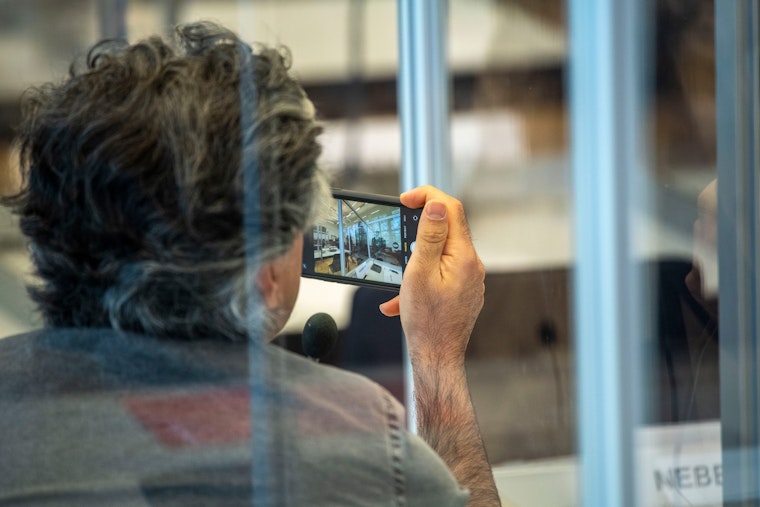How NGOs, Journalists, and Courtroom Eyewitnesses can Strengthen Reporting on Atrocity Crimes Trials
By Taegin Reisman

In late April, in the midst of the coronavirus pandemic, a landmark trial held its first hearing in Koblenz, Germany. Attendees, some of whom had traveled hundreds of kilometers to attend, were seated and separated by plexiglass to prevent the spread of the virus. On trial is Anwar R., a former Syrian regime official who has been charged with being an accomplice in torturing at least 4,000 people, murdering 58 people, as well as rape and aggravated sexual assault.
Even in under the remarkable circumstances imposed by the pandemic lockdown, civil society organizations are continuing to monitor hearings and release public reports to ensure that the public can follow proceedings—serving as an especially critical source of information to the Syrians who have waited years to see justice unfold. In an era when conspiracy theories can easily become viral, and accounts of mass atrocities and events during a conflict are often hotly contentious, it is up to journalists and human rights defenders to ensure that surges of disinformation are countered by verifiable facts accessible to the public.
“Individual trials can provide a measure of justice… They can reveal court-tested truths about the war that will outlast tides of propaganda,” note my colleagues Steve Kostas and Eric Witte, who are leading the Justice Initiative’s efforts toward accountability for atrocity crimes committed during the Syrian civil war. Reports on trials can serve as important historical records, as well as shed light on ongoing atrocities and help prevent future ones. With this in mind, observing and reporting on atrocity crimes trials pose a unique challenge, requiring communicators to clearly explain history and context, as well as complicated legal theories, legal procedures, and key actors to audiences often far removed from the courtroom.
That’s why the Open Society Justice Initiative’s Monitoring Atrocity Crimes Trials: A Guide, published earlier this year, offers clear guidance on what to monitor and how to convey important information. It provides instruction on a range of trial monitoring activities, from establishing a monitoring program to covering daily events in the courtroom, understanding target audiences, and selecting methods of communication. Comments from expert trial monitors throughout the guide also provide practical insights and paint a portrait of what to expect in the courtroom.
For instance, “[only] by sticking to the facts can you build trust in the communities who are following a trial,” notes one trial monitor who served with the Sierra Leone Court Monitoring Programme. Sometimes, that can require an ability to see past courtroom theatrics. “In monitoring atrocity crimes trials, there may be a temptation to focus on high drama points. For example, some lawyers may be particularly high energy or flamboyant while presenting their case,” observes another monitor. “However, a trial monitor’s energy is better spent on summarizing for readers the key points in the testimony or proceedings that appear to speak to the charges, to previous evidence or to the case of the party that is advancing this evidence.”
The protection of trial witnesses is also a critical consideration when sensitive evidence is being given or when a witness has a fear of retribution. Failing to provide witnesses with the protection and support they deserve can deter others from coming forward. “It's important that monitors fully report what any witness has to say, but respect any protective measures that have been put in place to keep the identity of the witness anonymous,” according to a Senior Advisor at Women's Initiatives for Gender Justice.
Despite the fact that the COVID-19 crisis has suspended hearings around the world, some atrocity crimes trials will continue. The same week as the Anwar R. trial began, another trial in Frankfurt, Germany, commenced against an alleged member of the Islamic State charged with genocide, human trafficking, and torture against the Yazidis. Then there is the International Criminal Court (ICC), where at least one new trial expected to start in July against the Malian war crimes suspect Al Hassan Ag Abdoul Aziz Ag Mohamed Ag Mahmoud. While a start date has not yet been announced, the court has also confirmed war crimes and crimes against humanity charges against Alfred Yekatom and Patrice-Edouard Ngaïssona pertaining to the 2013-2014 conflict in the Central African Republic. With the opening of a high-profile investigation into crimes committed in Afghanistan and the possibility that former Sudanese president Omar al-Bashir could be brought to justice for crimes in Darfur, many prospective cases loom in the ICC’s future that could set important precedents for international criminal law.
However, some have expressed concern that the coronavirus outbreak has caused processes aimed at combatting impunity of atrocity crimes to lose momentum. In the midst of the uncertainty now facing international justice, there is an imperative for all those who report on atrocity trials to document and communicate them with accuracy, fairness, and objectivity, so that the quest for accountability through international justice can continue to gain visibility and recognition in the public eye. Victims and others affected by these past horrors deserve no less.
The Open Society Justice Initiative’s Monitoring Atrocity Crimes Trials: A Guide aims to provide guidance to non-governmental organizations, journalists, and others on how to conduct trial monitoring activities. The International Justice Monitor, a project of the Justice Initiative, has documented atrocity crimes trials since 2007.
Until November 2021, Taegin Reisman was associate operations officer for the Open Society Justice Initiative.